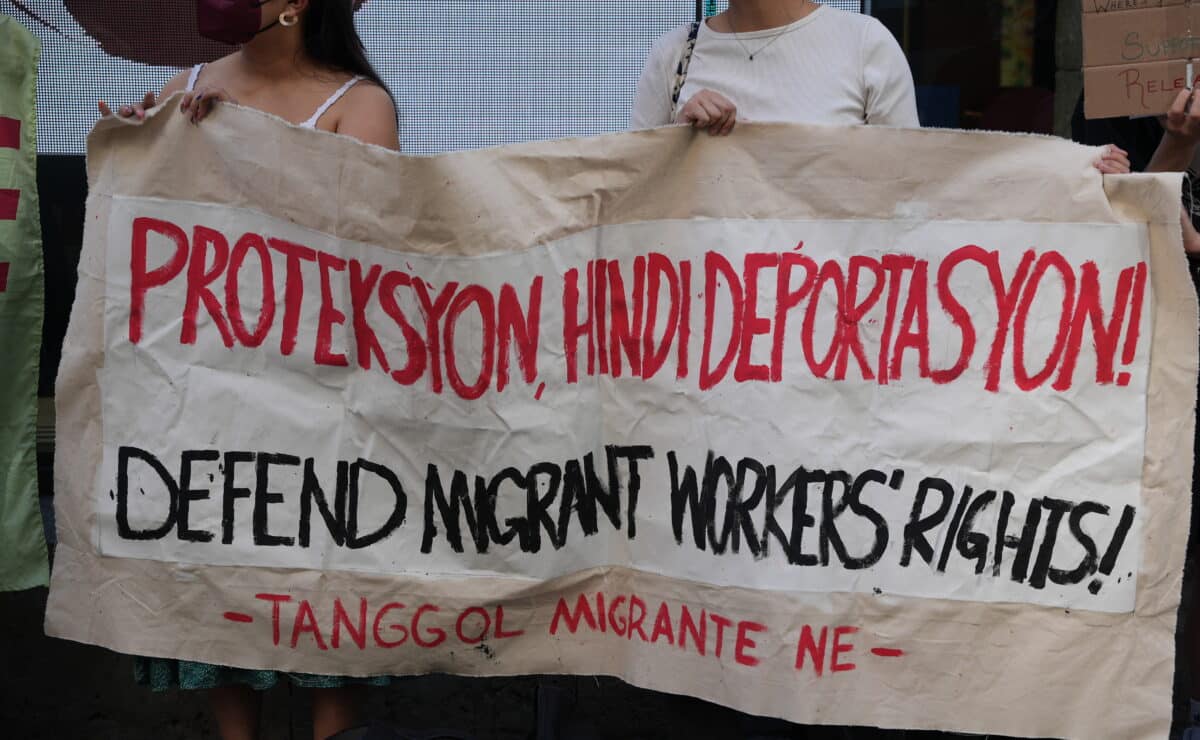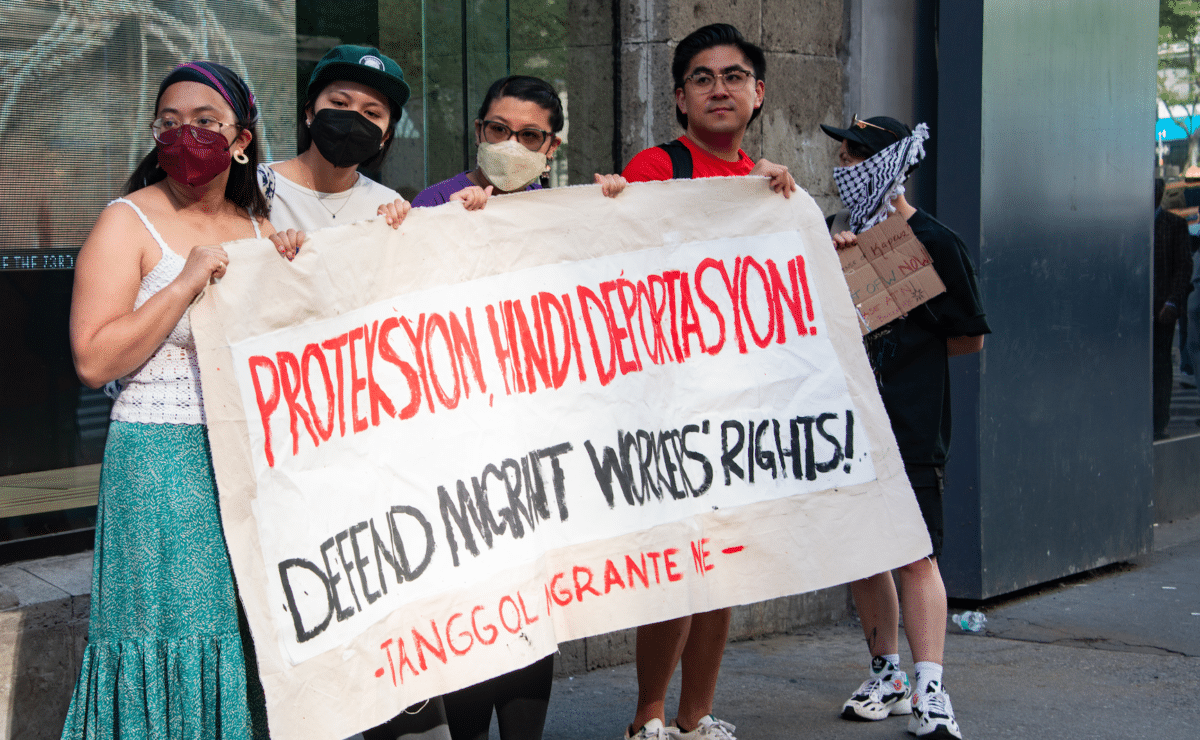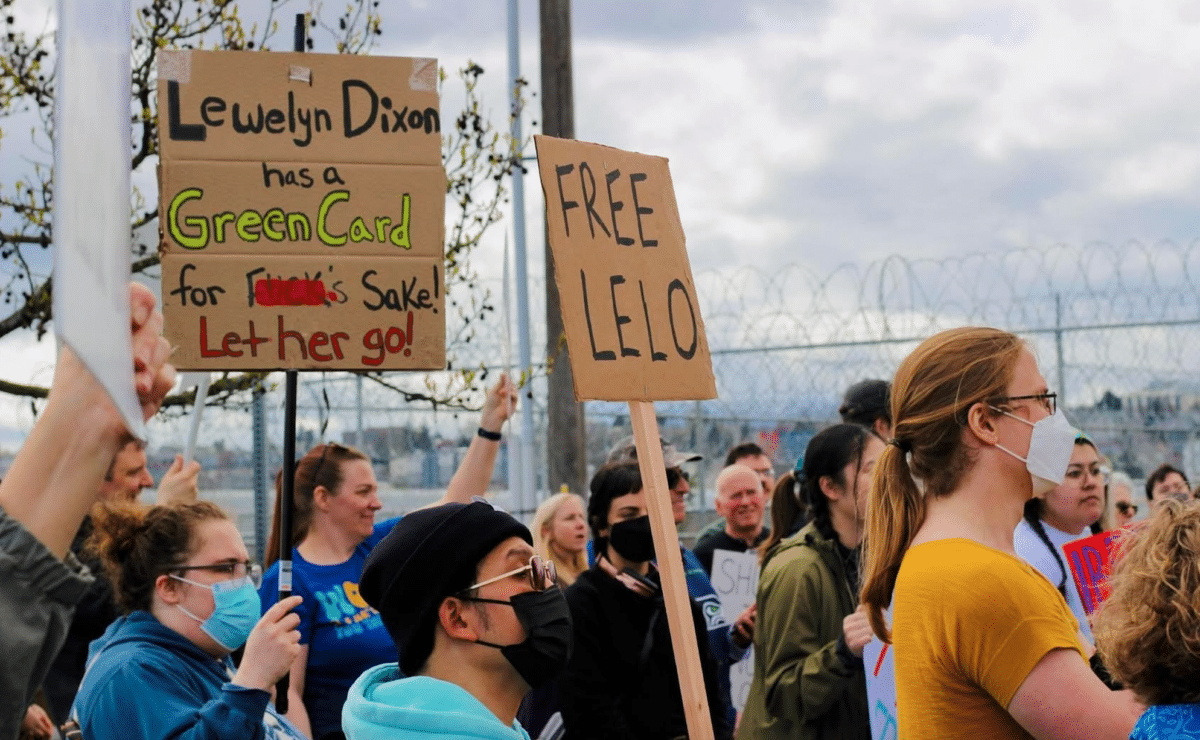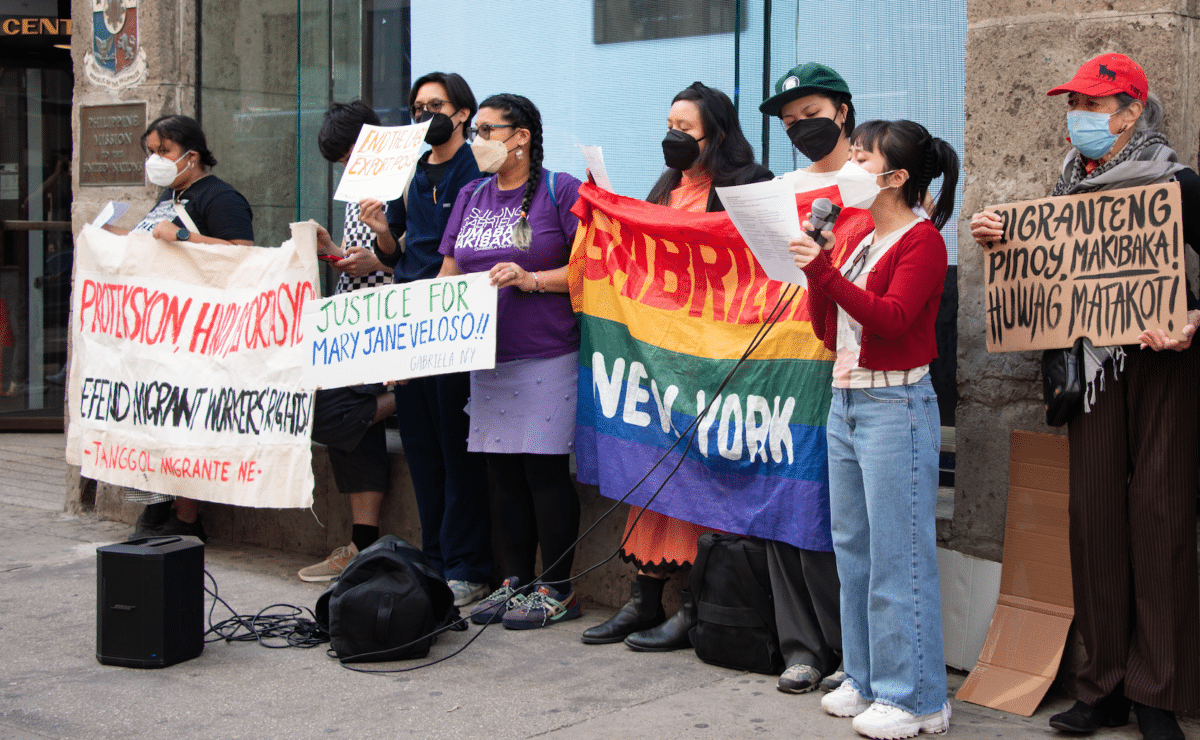Filipino mom released from ICE detention amid nationwide protests

CONTRIBUTED
NEW YORK — The migrant community can breathe a sigh of relief as “Michelle,” a Filipino mother detained by Immigration and Customs Enforcement (ICE), is set to celebrate Mother’s Day with her family.
This hard-earned victory comes after months of relentless advocacy and shines a spotlight on the systemic issues faced by Filipino migrants in the United States.
In a landmark development, Michelle, a green card holder and mother of three, was released from the Northwest Detention Center (NWDC) in Tacoma, Washington, where she had been detained since February.

FILE PHOTO. (AP Photo/Alex Brandon, File)
Just hours before Michelle’s release, another Filipino green-card holder from Alaska was also released.
Michelle’s release was met with cheers from nearly 100 community members who gathered to celebrate her impending reunion with her daughter, according to a press statement from Tanggol Migrante sent to Inquirer.net USA.

CONTRIBUTED
Michelle’s case underscores broader concerns about the treatment of overseas Filipinos and the alleged neglect by authorities.
Her story is intertwined with others like Lewelyn Dixon, a Filipina who had been detained at NWDC despite being a legal permanent resident for over 50 years.
Dixon’s detention made headlines earlier this year, highlighting the plight of long-term Filipino residents who got caught up in the immigration crackdown.

Hundreds join a rally in Seattle calling for the release of Fil-Am lab technician Lewelyn Dixon and Lelo Juarez Zeferino. CONTRIBUTED
Inhumane conditions
Michelle’s journey was similarly tumultuous. She was detained in California while returning from the Philippines, transferred to NWDC due to overcrowding at Bakersfield Detention Center and subjected to inhumane conditions.
She recounted her traumatic experience at San Francisco International Airport, where she was handcuffed and restrained.
Once at NWDC, she endured deplorable conditions. She and others inside were allegedly fed like “animals in captivity,” including being served undercooked chicken. She was denied medication for pain caused by a tumor in the back of her head.
Despite these hardships, Michelle and her advocates from the Tanggol Migrant Network (TMN) persisted. Their efforts culminated in her release – a victory that symbolizes hope and resilience for many Filipino families in the US.
Michelle secured a ruling to cancel her deportation order. She will no longer face forced separation from her daughter and will be able to access necessary medical care.
Filipino migrant workers like Michelle and Dixon are leading the fight against attacks on all migrants under President Trump’s administration.
Together with grassroots organizations, they have linked arms with other Filipinos, such as Ligaya Jensen, Alma Bowman and Dhenmark Francisco, who have also been detained in other states and subjected to similar cruel conditions.
“I look forward to joining everyone soon,” shared Ligaya Jensen with the network. “I long to be part of a society where I can serve and help others who have experienced hardships and harsh treatment by a system that needs improvement and change.”
Tireless advocacy
Community organizations such as Tanggol Migrante have responded with tireless advocacy – visiting Michelle regularly, organizing support letters, and raising funds for her basic needs.
“Seeing us support her today, Ate Michelle was tearful,” said CeCe, a Tanggol Migrante member. “But she brushed away her tears, stood strong and answered the judge’s questions with conviction. And I know that strength came from all of you,” she added.
The Filipino community’s advocacy has drawn attention to the Philippine government’s alleged neglect.
Johnny of Migrante Seattle condemned the government’s inaction. “The Philippine government didn’t do anything,” he said. “They willfully neglected her and left her to suffer in detention, just like many others.”
Despite official claims that Michelle was not on their radar, community groups demanded that the Philippine consulate in San Francisco visit her and her aunt Lynn to assess her conditions.
When the consulate finally visited in early April, they reportedly offered only token sympathy and failed to provide concrete assistance.
On May 1, the National Day of Action to Defend Migrants, activists across the country staged protests and delivered an open letter to Philippine Ambassador Jose Romualdez and President Bongbong Marcos, urging support for detained Filipinos like Michelle and other distressed migrants.

CONTRIBUTED
The embassy reportedly declined to meet with protesters, claiming, “The Philippine Embassy and Consulates General have been extending appropriate consular assistance to detained Filipino nationals to ensure they are treated according to the law and their wellbeing is protected.”
Jhem of GABRIELA Seattle criticized this response. “These remarks are so out of touch with reality,” he said. “If the Philippine embassy were truly monitoring the situation, they would see that Filipinos are suffering in detention, denied medical care and basic needs. Ambassador Romualdez should do his job or step down.”
Meanwhile, in New York and across the US, community groups condemned the Philippine government’s neglect during their own protests, coinciding with International Workers’ Day.
Organized by BAYAN Northeast, Malaya NY and Tanggol Migrante, the demonstrations highlighted cases like that of Dhenmark Francisco, a Filipino nurse assistant wrongfully detained by ICE.
Despite claims of support from the Philippine consulate, Dhenmark reportedly received only a fraction of the assistance owed to him – $200 of the $10,000 in Assistance to Nationals (ATN) funds. He was released only after significant community pressure, exposing gaps in government aid.
In a statement to Inquirer.net USA, community members reported attempting to deliver an open letter calling for accountability, but officials refused to engage.
Consul General Senen Mangalile reportedly walked out of the building surrounded by security, refusing to meet with protesters. Community leaders condemned this dismissive behavior, emphasizing that systemic neglect extends beyond individual cases.
“Consulates and embassies exist to serve their people,” the open letter states. “The Philippine state has failed in this regard, making insufficient efforts to support Filipinos in detention and distress. This lack of support pushes many into inhumane conditions, forcing some to seek deportation simply to escape suffering.”
Advocates also linked the plight of Filipino migrants to broader issues of US imperialism and economic exploitation.
Lex Bansil of BAYAN Northeast stated, “It is the thousands of U.S. troops in the Philippines that harass peasants and force them to migrate. The low wages in Manila drive workers abroad, where they face scarce protections. Our fight is for genuine sovereignty and a government that truly serves its people, not foreign profits.”
Filipino American advocacy groups called for urgent action, demanding that the Philippine government provide consistent support for all migrants, including those facing detention, trafficking or wage theft.
“Enough is enough,” said Issa Mars of GABRIELA NY. “We demand justice for our overseas workers, especially women, who are often victims of abuse and neglect. The Filipino government must finally prioritize the welfare of its people abroad.”
Inquirer.net USA reached out to the Philippine consulate in New York for comment but has yet to receive a response as of press time.
“Thank you so much for the support,” Michelle told Tanggol Migrante upon her release. “Until the very end, you all were there. Even if my family isn’t here, you all are here and have helped me. Thank you so much. I’ll see my child again.”

